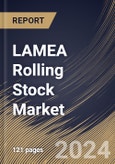One of the primary catalysts for adopting these stocks is the state of a country’s railway infrastructure. Developed economies with well-established and extensive rail networks often have a higher adoption rate for rolling stock. On the other hand, emerging economies may face challenges related to insufficient or outdated infrastructure, necessitating significant investments to accommodate modern stocks. It is integral to transporting bulk commodities such as coal, minerals, agricultural products, and manufactured goods. Freight trains equipped with specialized wagons efficiently move large quantities of bulk cargo over long distances.
The seamless transfer of products between various modes of transport, like trains, trucks, and ships, constitutes intermodal transportation. These stock, particularly container trains, plays a key role in intermodal logistics, promoting efficient and integrated freight transport solutions. Commuter trains are a vital component of urban and suburban transportation networks, providing a reliable and efficient mode of transit for daily commuters. They connect residential areas with city centers, alleviating traffic congestion and decreasing the environmental impact of individual car commuting.
The expansion of suburban areas due to population growth creates a demand for commuter rail services connecting these areas to urban centers in Saudi Arabia. With a larger population, traffic congestion in Saudi Arabia tends to increase. This prompts a shift towards public transportation, including trains and metro systems in Saudi Arabia. With a larger population contributing to increased travel demand between major cities in Saudi Arabia, there is a need for high-speed rail connections. High-speed trains and associated stocks become vital for providing fast and efficient intercity transportation in Saudi Arabia. Saudi Arabia’s Vision 2030 emphasizes the development of a modern and integrated transportation system. Thus, due to these aspects, the market will expand across the LAMEA region in upcoming years.
The Brazil market dominated the LAMEA Rolling Stock Market by Country in 2022, and would continue to be a dominant market till 2030; thereby, achieving a market value of $1,693.5 Million by 2030. The Argentina market is showcasing a CAGR of 8.3% during (2023 - 2030). Additionally, The UAE market would register a CAGR of 7.4% during (2023 - 2030).
Based on Type, the market is segmented into Diesel, and Electric. Based on Product, the market is segmented into Wagon, Rapid Transport, and Locomotive. Based on Train Type, the market is segmented into Rail Freight, and Passenger Rail. Based on countries, the market is segmented into Brazil, Argentina, UAE, Saudi Arabia, South Africa, Nigeria, and Rest of LAMEA.
List of Key Companies Profiled
- Alstom SA (Alstom Transport)
- Kawasaki Heavy Industries, Ltd.
- Siemens AG (Siemens Mobility)
- Wabtec Corporation (GE Transportation)
- Hitachi, Ltd. (Hitachi Rail Systems)
- CRRC Corporation Limited
- Hyundai Motor Company (Hyundai Rotem Company)
- IHI Corporation (Dai-ichi Life)
- Mitsubishi Heavy Industries Ltd. (Mitsubishi Power, Ltd.)
- Trinity Industries, Inc. (TrinityRail)
Market Report Segmentation
By Type- Diesel
- Electric
- Wagon
- Rapid Transport
- Locomotive
- Rail Freight
- Passenger Rail
- Brazil
- Argentina
- UAE
- Saudi Arabia
- South Africa
- Nigeria
- Rest of LAMEA
Table of Contents
Companies Mentioned
- Alstom SA (Alstom Transport)
- Kawasaki Heavy Industries, Ltd.
- Siemens AG (Siemens Mobility)
- Wabtec Corporation (GE Transportation)
- Hitachi, Ltd. (Hitachi Rail Systems)
- CRRC Corporation Limited
- Hyundai Motor Company (Hyundai Rotem Company)
- IHI Corporation (Dai-ichi Life)
- Mitsubishi Heavy Industries Ltd. (Mitsubishi Power, Ltd.)
- Trinity Industries, Inc. (TrinityRail)








